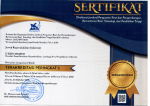ADVOCACY GROUPS FOR INDONESIAN WOMEN MIGRANT WORKERS PROTECTION
Abstract
International labour migration is one possible means by which the Indonesian government could overcome the problems of providing employment for its economically active growing population, especially in the local contexts. However, due to low educational levels, lack of skills and tight competition with labour migrants from other countries, the majority of Indonesian migrant workers abroad can only partake in unskilled employment in the plantation, construction, domestic or other service sectors. In 2012, it was estimated that there were more than 6 million Indonesian migrant workers overseas, with between 30 to 40 per cent of the total number, women, mostly working as low-skilled labour in the service sector as domestic workers and care givers. It has become evident that Indonesian migrant workers are vulnerable to abusive behaviour and exploitation, since they 2 | Jurnal Kependudukan Indonesia lack protection of their basic human rights and their rights at work, with Indonesian women migrant workers, due to the nature of their work and gender discrimination, facing a higher risk of being exploited. The Indonesian government does not provide its citizens, working as labour migrants abroad, with enough of the safeguards advocated in international protective instruments. Indonesia ratified the International Convention on the Protection of the Rights of All Migrants Workers and Their Families (ICRMW) only on 12 April 2012 and this needs to be followed up by some government regulations for full implementation. This condition highlights the importance of increasing the attention of institutions (government and private) involved in managing Indonesian international labour migration, especially its female labour migration, to improve the protection of their rights. This paper elaborates the role and strategy of various advocacy groups, (e.g, Non Government Organizations) in empowering Indonesian women migrants/potential migrants regarding their rights and obligations; to ensure their legal protection. The information is from some qualitative studies involving relevant sources of information, conducted by the authors, especially in the Indramayu District, West Java and the Tulungagung District, East Java. The analysis is that based on a life-cycle approach to protect migrant rights during their pre deployment, their onsite protection (in destination/host countries), their return and their reintegration in their home countries.
Keywords: Protection for Indonesian migrant workers, women migrant workers, advocacy, Non Government Organization
Keywords
Full Text:
PDFReferences
Azwar, A. (2011). â€Indonesia Buka Moratorium TKI ke Malaysia Pasca Penandatanganan MoUâ€. http://infopublik.kominfo.go.id/index.php?page=news&newsid=2693. Accessed 27/8/2011.
Habibie Center. (2010). “Lokakarya Agenda Strategis Pemenuhan Hak TKI Perempuanâ€. http://www.habibiecenter.or.id/detil.php?mod=news&id=57. Accessed 10/11/2010
Hugo, G. (2002). “Women International Labor Migration†in Robinson, Kathryn and Sharon Bessell (eds.), Women in Indonesia. Gender, Equity and Development, Indonesia Assessment Series, Institute of Southeast Asian Studies, Singapore.
JAKERLA PRT. (2009). “Pernyataan Bersama Jakerla PRTâ€. http://buruhmigranberdaulat.blogspot. com. 2009/08/pernyataan-bersama-jakerlaprt-ja. Accessed 12/10/2009.
Komnas Perempuan. (2006). â€Role of National Human Rights Institutions in Protecting the Human Rights of Undocumented Migrant Workers and Women Migrant Workersâ€.
Liewkeat, P. (2010). “The International Convention on the Rights of All Migrants and Their Families: Strengthening Policy Framework, Observation and Recommendation from ILOâ€. Paper presented in the Workshop of Ratification of the UN Convention 1990, 4 November 2010, Jakarta.
National Commission on Violence Against Women. (2006). “Human Rights for Allâ€. Role of National Human Rights Institutions in Protecting the Human Rights of Undocumented Migrant Workers and Women Migrant Workers’. Jakarta.
Notes from the Regional meeting to Enhance the Human Rights Approach in Asia, Komnas Perempuan and Ford Foundation, Jakarta.
Nugroho, H. (2009). “Hentikan Derita Perempuan TKI di Luar Negeriâ€. http://agupenajateng.net/2009/06/22/hentikan-derita-perempuan-tki-di-luar-negeri/. Accessed 10/11/2010.
Raharto, A. (2007). “Indonesian Labor Migration: Issues and Challenges’ in International Journal on Multicultural Societiesâ€. UNESCO Vol 9, No.2: 219-235.
Raharto, A., Dalyo, Alihar, F., Hugo, G. J., Romdiati, H., Noveria, M., Mujiyani, Bandiyono, S., & Soewartoyo, (2002). “Kebutuhan Informasi bagi Tenaga kerja Migran Indonesia. Studi kasus di Provinsi Jawa Barat, Kalimantan Timur dan Riau, Pusat Penelitian Kependudukanâ€. Lembaga Ilmu Pengetahuan Indonesia, Jakarta.
Republic of Indonesia Act No. 39. (2004). Concerning Placement and Protection of Indonesian Workers Overseas.
Rianingsih, M. (2000). “An Experience on Empowerment of Indonesian Migrant Workers’,Paper presented in the Workshop on the Need for Information and Indonesian Migrant Workersâ€, 29 – 30 May 2000, Jakarta.
Soewardi. (2000). “Policy on Placement of Indonesian Migrant Workers Overseasâ€. Paper presented in the Workshop on the Need for Information and Indonesian Migrant Workers, 29 – 30 May 2000, Jakarta.
The International Migration Policy Programme. (2001). “Global Migration Challenges – Where are the Common Interest and Mutual benefit?â€. Discussion Paper 1. International Symposium on Migration, 14-15 June 2001, Berne.
Wardana. (2011). “Perlindungan TKI di Singapuraâ€. Paper presented at Stakeholders Dialogue on Evaluation of Labour Migrant Protection Policies in Critical Period and Attempt to Search for The Breakhthrough, 26 Janiari 2011. Jakarta.
_____. (2006). Kasus TKI. http://www.nakertrans.go.id/pusdatinnaker/tki/tki_kasus_05.php. Accessed 29/9/2006
_____. (2007). Hasil Diskusi Permasalahan TKI dengan Institusi Terkait di Malaysia. http://www.depsos.go.id/modules.php?name=news&file=print&sid=449. Accessed 09/04/2010
_____. (2011). Perlindungan TKI Indonesia di Malaysia. http://saifulaiman.blogspot.com/2011/05/mou-perlindungan-tki-indonesia-malaysia.html. MoU Perlindungan TKI Indonesia - Malaysia Ditandatangani. Accessed 27/8/2011.
_____. (2012). Arab Saudi Tolak Tenaga Kerja Indonesia, pemerintah Diam!. Thttp://rimanews.com/read/20120324/57947/arab-saudi-tolak-tenaga-kerjaindonesia-pemerintah-diam. Arab Saudi Tolak Tenaga Kerja Indonesia, Pemerintah Diam!. Accessed 24/5/2010.
DOI: https://doi.org/10.14203/jki.v7i1.80
Copyright (c) 2016 Jurnal Kependudukan Indonesia

This work is licensed under a Creative Commons Attribution-NonCommercial-ShareAlike 4.0 International License.
-----------------------------------------------------------------------------------------------------------------------------
Research Center for Population, Indonesian Institute of Sciences
Widya Graha Building, 7th and 10th floors
Jl. Jenderal Gatot Subroto 10 Jakarta Selatan, Telp (021) 5221687
Website: http:/kependudukan.lipi.go.id;
E-Journal: http://ejurnal.kependudukan.lipi.go.id
Pustaka: http://pustaka.kependudukan.lipi.go.id
-----------------------------------------------------------------------------------------------------------------------------








